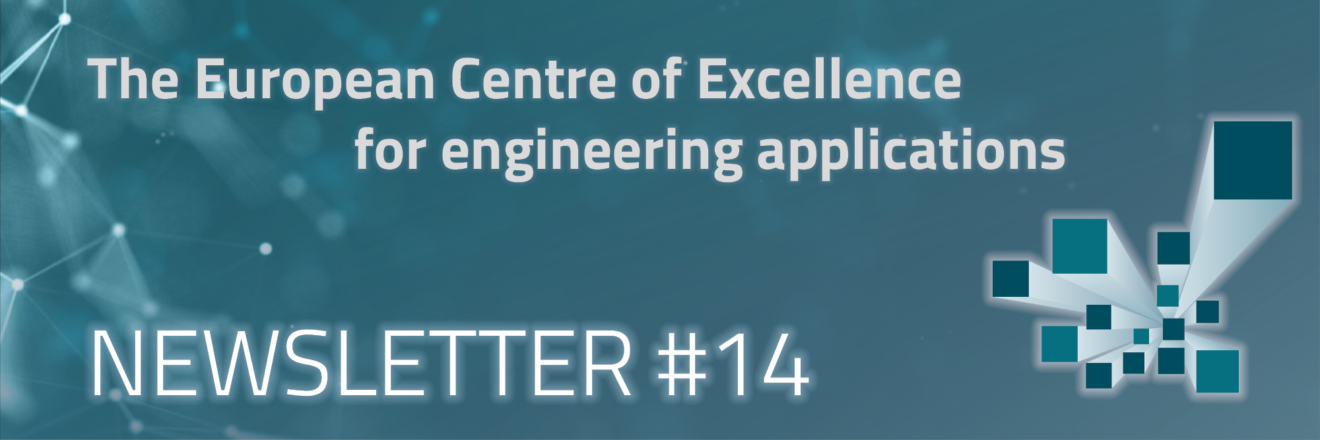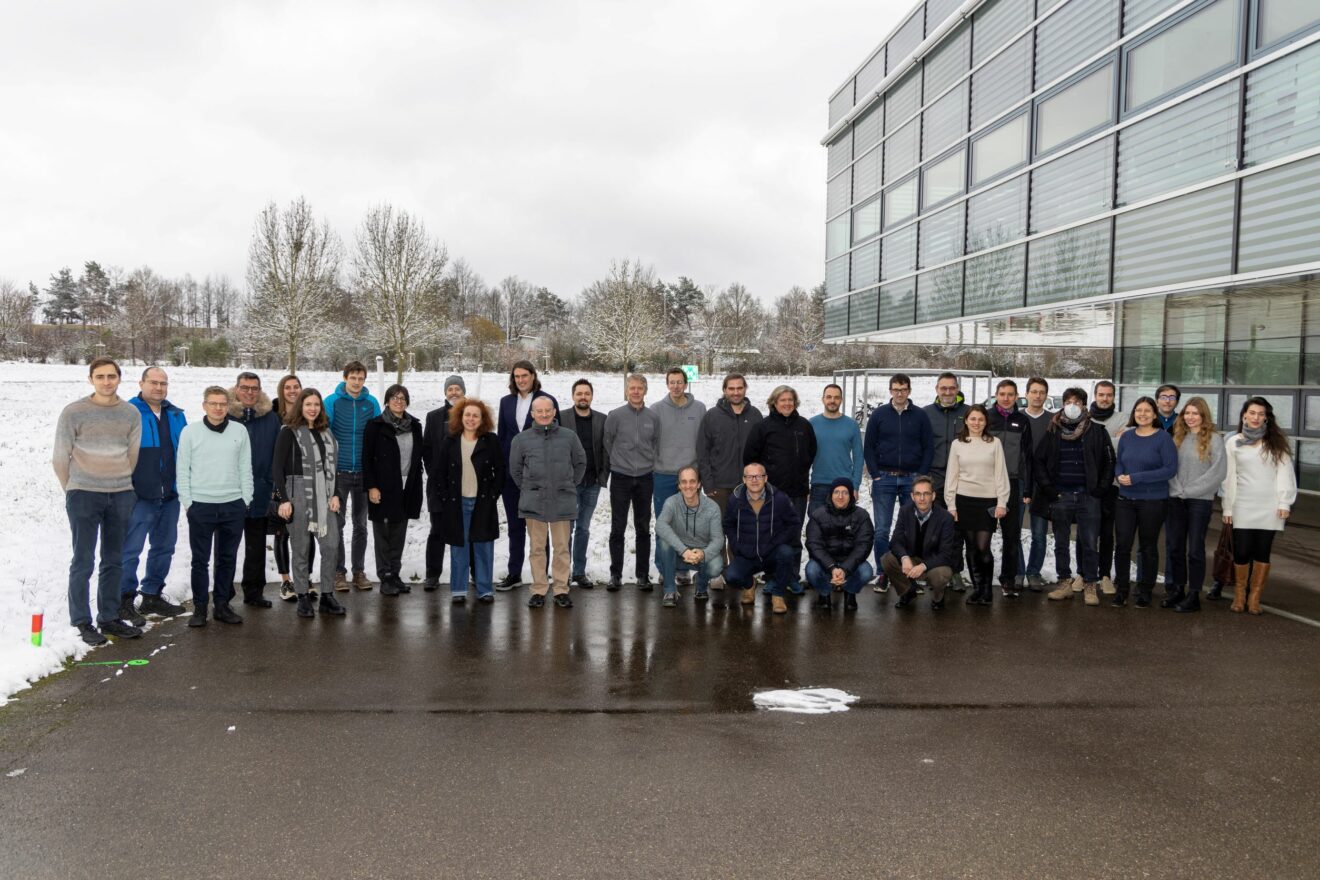|
|
|
|

|
Content
|
|
2. EXCELLERAT begins its second funding phase
|
3. Studying the geography of a software
|
|
|
|
|
|
1. Welcome
|
As of 1 January 2023, the second funding phase of EXCELLERAT has started. We will continue on its successful journey over the coming four years, with a consortium of 15 partners – three new ones joined the team! We look forward to continuing and expanding on the great collaboration we established in the first phase. The seven chosen codes EXCELLERAT is focusing on in the second project phase are: CODA, AVBP, m-AIA, Alya, NEK5000, FLEW, OpenFOAM, and Elmer. EXCELLERAT P2 will base its evolution and developments on six selected use cases and one additional application that require the full range of HPC usage profiles, from small scale applications all the way to run large scale applications.
|
In this issue of our newsletter, you can find out more about our kickoff meeting and the plans made for the second project phase, learn about software geography in a blog article by Cerfacs, and get information about upcoming events.
|
I hope you enjoy reading our newsletter and continue to follow our updates!
|
|
EXCELLERAT P2 Project Coordinator
|
|
|
|
2. EXCELLERAT begins its second funding phase
|

|
|
After a short break, EXCELLERAT P2 began in January 2023, along with nine other European Centres of Excellence that will develop and adapt HPC applications for the exascale and post-exascale era. For the start of the second phase of the project, representatives from the 15 consortium partners in Spain, Germany, Italy, Sweden, Slovenia, and France came together for a two-day kickoff workshop. The meeting took place on 18 and 19 January at the coordinating centre, the High-Performance Computing Center Stuttgart. Both days were dedicated to the exchange of views and ideas in order to strengthen the ongoing and future cooperation. Seven work packages were presented, their contents discussed and common goals agreed on. There was also room for personal exchange and getting to know each other, especially in the case of the three new project partners, SiPEARL, University of Ljubljana, and Sapienza Università di Roma. Read our article to find out more about the plans for project phase two.
|
|
|
|
3. Studying the geography of software
|

|
Have you ever tried walking in a city you’re completely new to, without having any idea where you are or how it’s organized? If you take it linearly, one street after the other, it can be quite long and exhausting to get to know the city! So what do you always end up doing? You mentally create a map of it. Would it have been easier and taken less time and effort if you'd had a map in the first place? Then you could have memorized the general scheme of the city, seen how different parts of the town are linked with each other, and focused on the parts of interest to you.
|
The idea in software geography is the same: being a new developer to a software, you could either spend months reading it linearly before figuring out how certain blocks are linked together, and finally start building a mental map of it over years – or you could start with a map. This is exactly why a global callgraph of a software can be useful: it’s for you to see the “geography” of the software. Learn more in a blog article by our partner Cerfacs.
|
|
|
|
4. Further news & events
|
We have recently launched a YouTube channel – subscribe for multimedia updates.
|
|
(20-23 March 2023, Gothenburg)
|
EXCELLERAT will take part in the EuroHPC Summit, an annual event now organised by the EuroHPC Joint Undertaking, gathering key European HPC stakeholders from providers, to scientific and industrial users, to policy makers. EXCELLERAT will be represented with a project poster at the Poster Session on Tuesday, 21 March, 6-8 pm CET. More information
|
Training course: From machine learning to deep learning
|
This course addresses students, data scientists, and researchers who would like to have an introduction to Machine and Deep Learning methods to solve challenging and future-oriented problems. Both Machine and Deep Learning methods and examples as well as a method for data compression will be presented. Different examples are shown via hands-on sessions on an HLRS cluster. However, please be aware that this course is not a sequence of beginners-to-advanced lectures about theoretical aspects of AI. Registration coming soon
|
|
Training course: Data analytics for engineering data using machine learning
|
|
(12-14 June 2023, online)
|
This three-day online workshop addresses the preparation, analysis and interpretation of numerical simulation data by machine learning methods. Besides the introduction of the most important concepts like clustering, dimensionality reduction, visualization and prediction, this course provides several practical hands-on tutorials using the python libraries numpy, scikit-learn and pytorch as well as the SCAI DataViewer (see also the SimExplore tool). Registration coming soon
|
|
Self-paced course: Approaches to analysing time-series data
|
|
Tourist destination managers, service providers, and researchers want to better understand traffic flows: what impact traffic flows have, when do traffic peaks occur, what are the seasonal effects, which areas are more / less congested with tourists, how do weather, holidays and other events affect this behaviour. With the help of data analysis and forecasts, they can prepare for periods of increased visits, as well as adjust marketing activities, service offerings, or resources allocation. In this tutorial we look at a real-world dataset consisting of traffic counters on Slovenian roads, provided by the Slovenian Road Network (DARS), and its application to the questions above. Get access to the tutorial through our Service Portal.
|
|
|
|
|
|

|
|
Funded by the European Union. This work has received funding from the European High Performance Computing Joint Undertaking (JU) and Germany, Italy, Slovenia, Spain, Sweden, and France under grant agreement No 101092621.
|
Höchstleistungsrechenzentrum Stuttgart (HLRS) | Nobelstraße 19
|
|
70569 Stuttgart | Germany
|
|
|
|
|
|
|